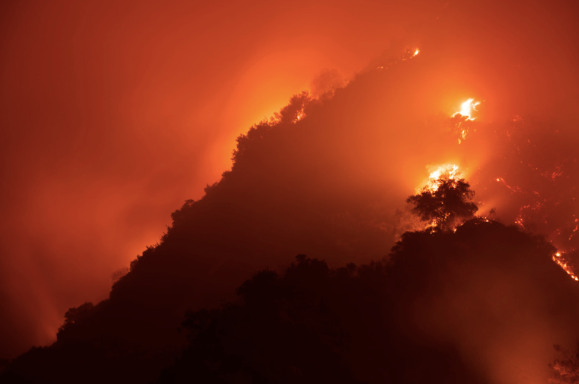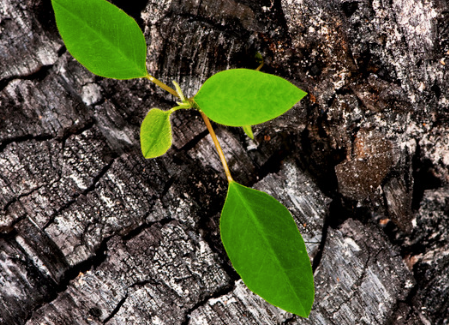Here is the seventeenth installment of our Exodus series. You can access the whole series HERE. You can take a few minutes to read Exodus 33-34 HERE. We will walk through the passage looking for ecotheological themes and consider implications for ecological discipleship. Comments and questions are welcome.
Moses' Act of Solidarity
When Moses came down from Mount Sinai and saw that the people had forged an idol and broken their covenant with the LORD, he smashed the stone tablets on which the Ten Commandments had been written. I can picture the shards scattering across the desert landscape, physically symbolizing the broken relationship between God and the people. An uncertain future lies before them.
In the midst of this brokenness and uncertainty, Moses' relationship with God remains steady. We are told that "the LORD would speak to Moses face to face, as one speaks to a friend." Instead of protecting his special status, Moses risks his unfettered access by asking God not to abandon the people. When God responds with, "My Presence will go with you, and I will give you rest," Moses links his fate with that of the people - "If your Presence does not go with us, do not send us up from here." It is a courageous act of solidarity and leadership, and God responds in a way that clearly holds Moses up as an example - "I will do the very thing you have asked, because I am pleased with you and I know you by name." Moses follows this up with a remarkable request to see God's glory, which God conditionally agrees to. Moses is not a perfect leader, but these acts of solidarity and chutzpah are ones that anyone in a leadership role should learn from.
Something New Emerges
As a result of this incredible interaction between God and Moses, new stone tablets are chiseled, and God makes a new covenant with Israel. It is, surprisingly, an unconditional covenant. In other words, God does not put requirements on the people for the covenant to continue - it is based wholly in mercy and grace. God still expects the people to live in accordance with the divine will, but there is no threat that God will abandon the people if they stray again. Out of the rubble of the people's failure, a new side of God has been revealed. It is no wonder that Moses' face begins to shine after talking with God - he has truly "seen" God's glory, the grace, compassion, and mercy that shines forth from the very heart of God. The future remains uncertain, but it will be a future in which God remains with them.

Our Modern Apostasy
These chapters have me thinking about the failure of the Church in our age of ecological catastrophe, the leaders who are standing in the gap, and the possibility of something new emerging that might reflect God's glory, shine light on a new pathway forward, and help us begin again.
I wrote in my last column about the idols we have forged that have helped create the ecological and social problems that now stretch across the face of the earth. We (both humans in general and Christians in particular) have rejected our calling to be earthkeepers, to co-sustain this beautiful earth in ways that reflect God's intentions for a flourishing world. I've been making a case through this series that Exodus is thoroughly ecotheological in its outlook - and this includes the Ten Commandments. Because the world is interconnected and interdependent, failing to care for the earth stresses, and sometimes breaks, our relationships with God and our fellow humans.
The shards are piling up around us. The latest example of this can be seen in the smoldering rubble of the city of Lahaina. Hawaiian journalist Naka Nathaniel argues that the wildfire that leveled Lahaina and ravaged Maui was not a natural disaster:
"The way we’ve disrespected our land and our culture have left at least dozens dead and one of the most beautiful places on the planet devastated. Human-made climate change, militarization and greed caused these deaths, not a hurricane hundreds of miles away."
Lahaina is where Christianity took root on Maui, but not in a native, indigenous way. Western missionaries imported a faith wrapped up tightly in western culture. As Native Hawaiian, and Christian pastor, Jim Sequeira writes,
"When the first missionaries arrived in Hawai’i in the 1820s, they referred to Hawaiians as repulsive, savages, and immorally extreme. One wrote in her journal: “Week after week passes and we see none but naked, filthy, wicked heathens with souls as dark as the tabernacle which they inhabit. The darkness of the people seems to destroy the beauty of the scenery around us.” They convinced Queen Ka’ahumanu, a Christian convert, to outlaw dancing the hula in public in 1830, arguing that it promoted heathen beliefs. The missionaries believed deeply that they were engaged in a spiritual battle. In reality, it was a cultural battle of turning Native Hawaiians into 19th-century Americans."
This "cultural battle" also meant supporting colonial practices of property seizure, resource extraction, and land abuse. The contemporary consequences of these historic practices are what Naka Nathaniel is pointing to when he writes, "Our islands have been disrespected for centuries." Nathaniel also notes that what needs to emerge from the ashes of Lahaina is not a carbon copy of what was, but a new approach rooted in a new consciousness. "We need to heal our islands or we are doomed to suffer more of these catastrophes. We need to plant, plant, plant before we build, build, build. The foundation of a future rebuild must include forests and sustainable, healthy approaches to agriculture."

Emerging Faith
The "foundation of a future rebuild" that Nathaniel refers to calls followers of Jesus to reform our faith in ways that integrate care for the earth into its very center - what we often call ecological discipleship. The good news is that this reformation is already happening. It is in many ways emerging from indigenous followers of Jesus, who, like Moses, have not been complicit in the apostasy that has brought us to this point. Indigenous leaders are providing corrective critiques to western theological and ecclesiological assumptions and are graciously offering alternatives that invite us into deeper relationship with Creator and creation. One such leader is Native Hawaiian, and Christian pastor, Jim Sequeira, who writes,
"Hawaiians understood that their land and their culture was a blessing from the Creator, and as they were blessed, they freely shared what they had to bless others. While Christian colonialism did not have room for my Hawaiian culture and identity, the Triune God did. This was when I began to see how my Hawaiian identity and my Christian faith could and did coexist. God the Father had begun a good work on some remote islands in the middle of the Pacific Ocean long before the missionaries arrived."
The graciousness of this perspective models the divine grace and mercy shown to the Israelites in their time of repentance.
Reform is also coming from those who have been part of colonial cultures but are modeling repentance and laying the foundation of a new way forward. Pope Francis, the current leader of the largest expression of western Christianity, the Catholic Church, articulates this powerfully in his encyclical Laudato Si'. Careful readers of the encyclical have summarized the work into "Ten Green Commandments":
I. Earth, our common home, is in peril. Take care of it. God loves his creation and so must we, and “love” is an active verb.
II. Listen to the cry of the poor who are the disproportionate victims of the crisis of our common home. The ecological crisis is not only a physical problem, but also a deeply moral one.
III. Rediscover a theological vision of the natural world as good news (gospel). The world is indeed “good news” that reveals the love, beauty, and glory of the Creator.
IV. Recognize that the abuse of creation is ecological sin. The destruction of our common home calls for repentance.
V. Acknowledge the deeper human roots of the crisis of our common home. Repentance begins by acknowledging human responsibility for the destruction.
VI. Develop an integral ecology, as we are all interrelated and interdependent. As every ecologist (and every farmer) knows, you cannot do just one thing.
VII. Learn a new way of dwelling in our common home and manage it more responsibly through a new economics and a new political culture. We need a new way to live on Earth, including a new economy and a new political order, focused on the common good of all creation.
VIII. Educate toward ecological citizenship through change of lifestyles. Ecological citizenship means establishing a new covenant between humanity and the natural world.
IX. Embrace an ecological spirituality that leads to communion with all creatures. The natural world is permeated with divine presence.
X. Care for our common home by cultivating the ecological virtues of praise, gratitude, care, justice, work, sobriety, and humility.
Perhaps we should inscribe these on stone pillars next to the original Ten Commandments. Of course, displaying them publicly is not the same as putting them into action. As Francis puts it, "A great cultural, spiritual and educational challenge stands before us, and it will demand that we set out on the long path of renewal." I continue to meet people who have set out on this "long path of renewal." I believe that this emerging movement of the Spirit is calling and gathering more and more people, including you.
I would love to hear about your journey - would you take a few minutes and respond to the following questions?
How have you set out on "the long path of renewal"? Who has helped guide you? Where do you see change occurring? What do you think is most needed?
Leave a comment below, or email me directly at james.amadon@circlewood.online.
With you on The Way,
James